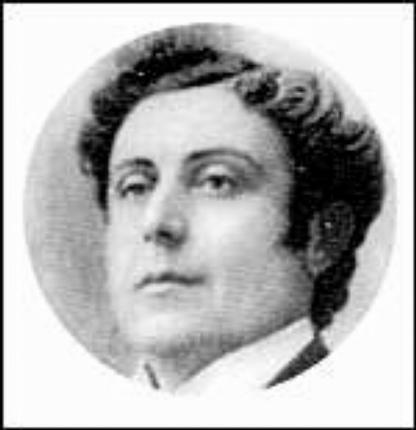Nikos Moraïtis
Nicolas Moraïtis was born in Athens in 1880. He was of humble origin and his father was a plasterer or traded in building materials. He had a very rudimentary general and musical education. At an unknown date he married Athena Skoutari. He made his military service at the corps of engineers where his voice was noted. He studied with Dionysios Lavrangas who also said that Moraïtis' voice reminded him of Ioannis Apostolou. He became a member of Lavrangas' opera company "Elliniko Melodrama". It is said that he learnt eight operas in six months: "O ypopsifios vouleftis" (The parliamentary candidate) by Xyndas, Bizet's "Carmen", Mascagni's "Cavalleria rusticana", Donizetti's "Lucia di Lammermoor" and "La favorite" and Verdi's "Ernani", "La traviata" and "Rigoletto". He must have made his debut in early 1901 in "The parliamentary candidate" and with such a success that he was forced to repeat twice and thrice the romanza "Panta enthymoume" (I always remember). On 28 August 1901 he sang the role of the Duke in "Rigoletto" and gave three encores of "La donna è mobile". He won a reputation for going fearlessly into the highest register (C and D). In 1905, he sang in Smyrna, Corfu, İstanbul and Thessaloniki. In 1907/08, he made a long tour to Chania (Crete) "where the public was moved to enthusiasm by his sweet voice". In 1908, he was engaged to sing in Egypt (Alexandria and Cairo) where "he won universal acclaim" as Ernani and in the title role of "Markos Botsaris", an opera by Greek composer Pavlos Carrer. From October 1911 to early 1912, he made a tour to İstanbul, Costanţa, Brăila, Bucharest and Odessa, where he sang in "Ernani" and "Tosca" with the famous Italian baritone Eugenio Giraldoni (1871–1924), who had created the role of Scarpia. From Odessa he went to Milan for further studies, but he only stayed there for a few months and returned to Greece, scared by the outbreak of the First World War. In Athens he sang "Cavalleria rusticana" and "Pagliacci" and made frequent appearances in Greek operas, such as "La martire" by Spyros Samaras, "O protomastoras" (The masterbuilder, 1916) and "To dachtylidi tis manas" (Mother's ring, 1917), both by Manolis Kalomiris. In autumn 1924, he toured the USA with Artemis Kyparissi, Michalis Vlachopoulos and baritone Elias Ekonomidis and made a large number of recordings for "Acropolis" National Greek Opera Records, a company formed by Greek expatriates expressly for that purpose. In 1928, he sang "Ernani" in Athens, and in February 1933 in Corfu, "Lucia di Lammermoor" and "La traviata" with Elvira de Hidalgo. He sang for the last time in April 1936 in a broadcast of the medieval liturgic "Hymn of Kassianí" in a chorus along with the bass Nicola Moscona. He died on 6 March 1938 of cardiac angina. On his gravestone there is the following inscription: "Nikos Moraïtis, the nightingale of the Elliniko Melodrama". The modern listener, accustomed to a completely different style of interpretation, finds it difficult, upon a first hearing, to associate the strange, old-world expressiveness of his warm voice in the "Siciliana" from "Cavalleria rusticana" with the descriptions of the vocal, musical and interpretative qualities of Moraïtis. Undoubtly, he was a man of his time and a tenor of his time.
I wish to thank George Leotsakos and Juan Dzazópulos for the biographical notes. I wish to thank Vladimir Efimenko for the recording (Cavalleria rusticana) and picture. |
